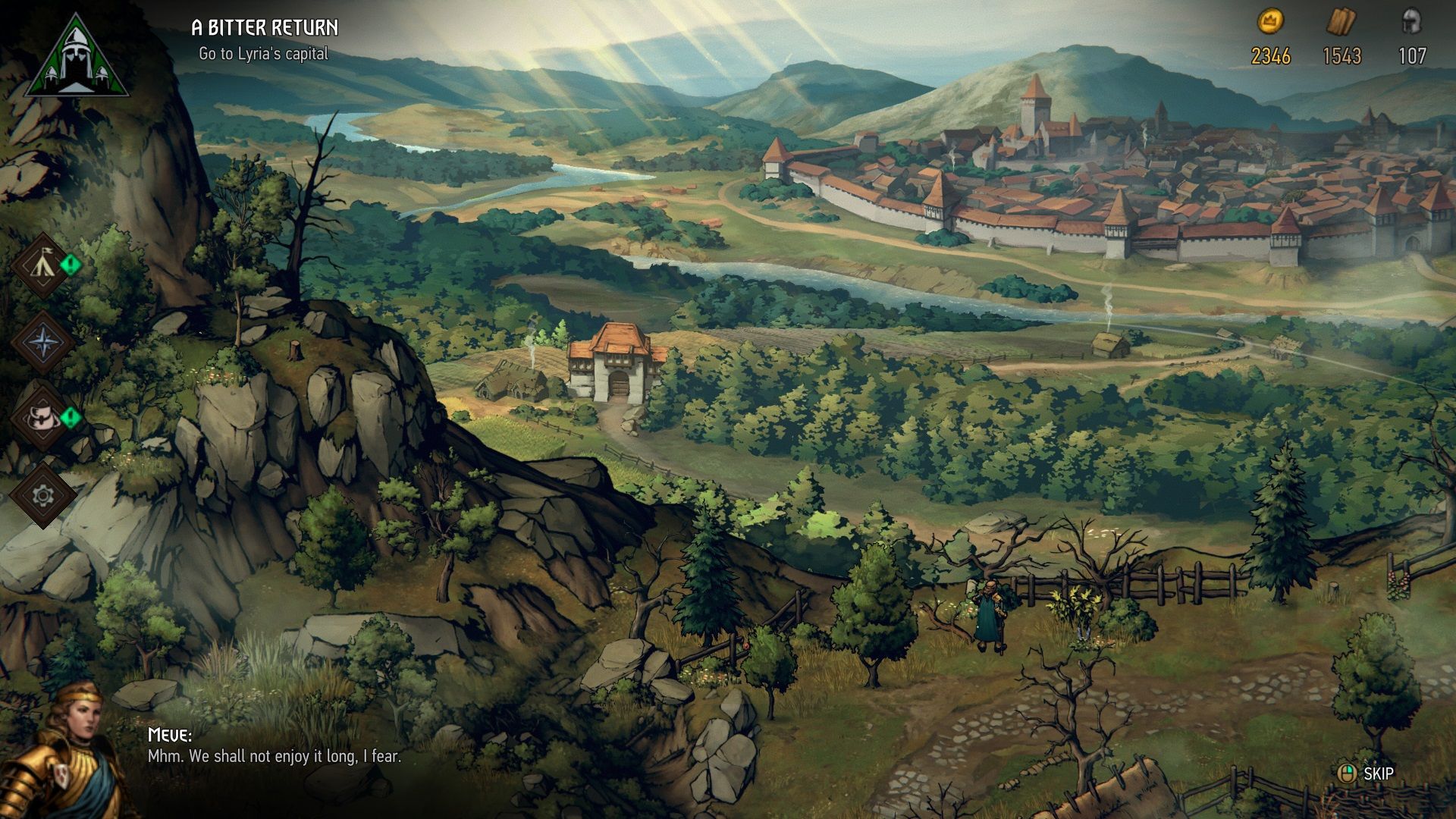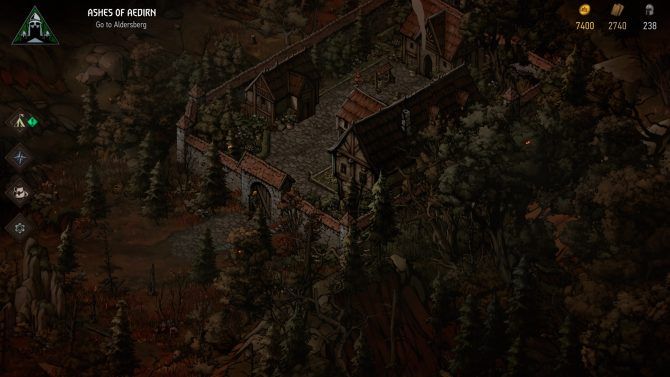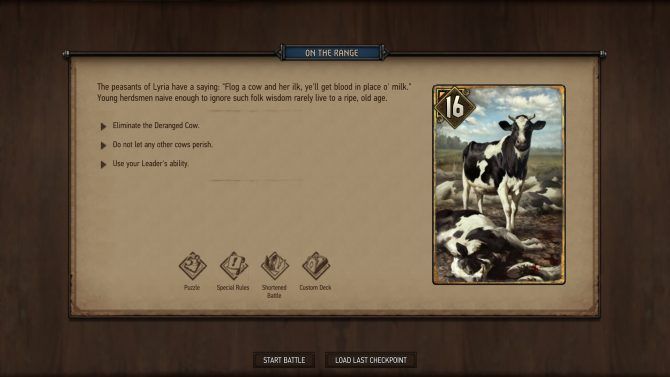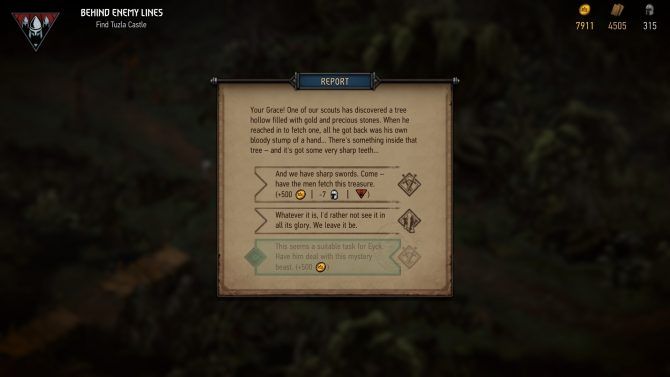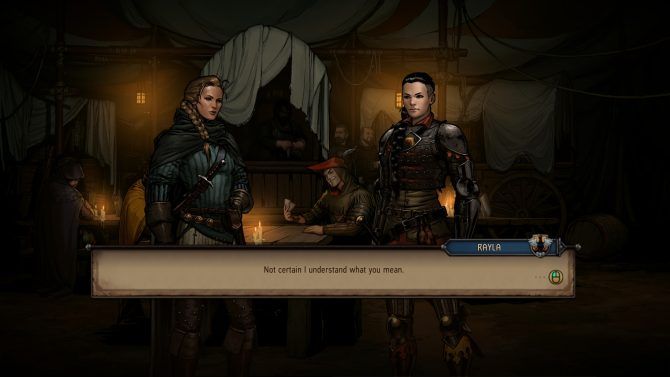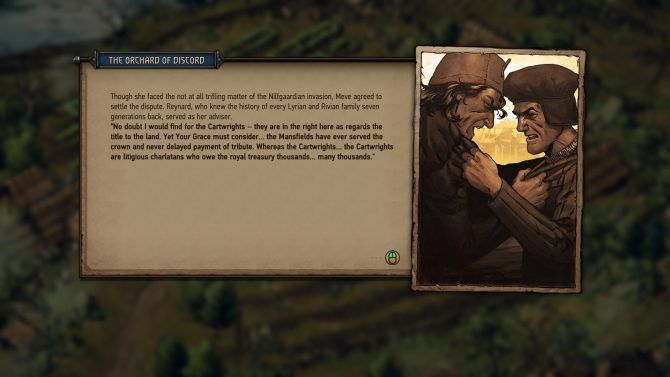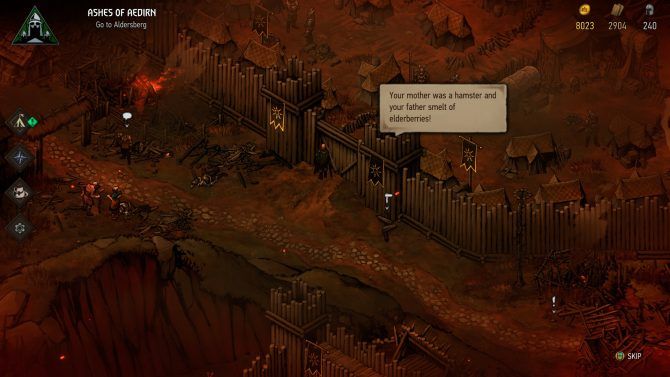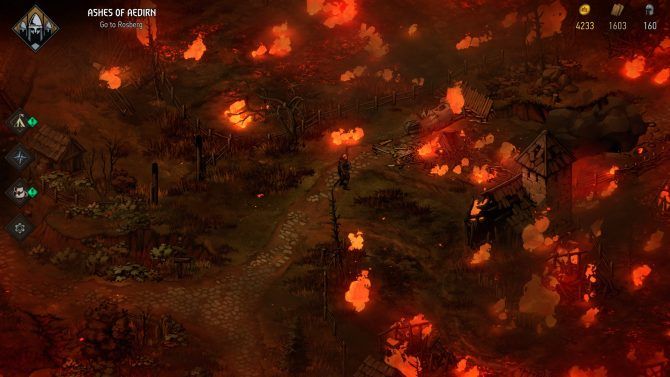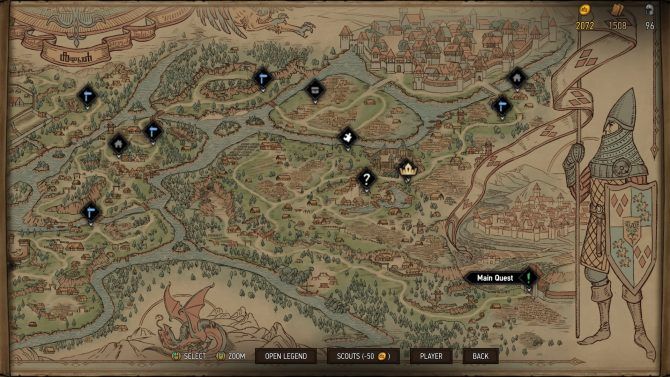Thronebreaker: The Witcher Tales is a new piece of Witcher fiction, and therefore something I was immediately interested in. Having finally completed The Witcher 3: Wild Hunt earlier this year and begun the book series that started it all, I am still hungry for more media taking place in that world. While Gwent: The Witcher Card game is the first TCG I've engaged with seriously, it lacks the character interactions and tough decisions that made me love the franchise. Due to this, Thronebreaker's chief gameplay mechanic, a simplified Gwent card game, quickly becomes overshadowed by a desire to engage with its story and decision making that were nearly always more satisfying than winning another Gwent battle.
The narrative is framed as a storyteller in custody of some mercenaries being taken to the Queen of Zerrikania for reasons that are never detailed. During an evening of rest he begins the tale of Meve, Queen of Lyria and Rivia who is returning home after meeting the other rulers of the North to discuss the impending Nilfgaardian invasion. Meve is presented as a battle-hardened queen ready to fight alongside her soldiers as well as stubborn and unwilling to compromise with others.
She doesn't believe her son Villem is prepared to lead after learning of his failure to secure the borders and allow a bandit group called the Strays of Spalla to raid Lyrian villages. Puzzlingly, she never mentions she has another son throughout the game, a son who even appears in the Blood and Wine expansion for The Witcher 3: Wild Hunt, so it's not like he isn't acknowledged by the game series. The opening section of Lyria serves as a good template for what you will encounter throughout Thronebreaker: puzzles, battles, hard decisions, resource gathering and management, and story beats.
Gwent is the primary gameplay tool by which all battles and puzzles are done, though it is modified from the Gwent standalone title. In Thronebreaker there are only two rows of play instead of three. Standard battles are still three turns, with the ability to redraw up to six cards and draw three at the beginning of the second and third round. Gwent cards are based on your current army, which can be expanded by investing resources into your war camp and crafting new or additional units.
A deck is still required to have at least 25 cards, though a cap now exists in regards to how much resources units consume when in your deck, meaning you have to balance both the number of total cards and how much each cost. The ceiling for that cost can be increased by upgrading your camp, and on an easy playthrough was never much of a bother. The makeup of your deck is also affected by the narrative, as characters you recruit or banish from your army means their card is either added or removed from your deck. Due to this, decisions based on who stays and who leaves can be influenced more by their abilities in battle than their morality or actions.
Across each map in Thronebreaker are puzzles, unique challenges that alter the standard Gwent gameplay by giving you a custom deck, changing abilities, and requiring certain goals be met to win. These, along with specific story battles that share similar goals and modifications, are the best gameplay bits of Thronebreaker.
Puzzles are often challenging, requiring a few tries before you solve it, sometimes even stumbling into it haphazardly. The way the puzzles modify existing rule sets and force the player to play a certain way is a lot of fun, though eventually I began to forgo them in favor of seeing the next story beat.
Story battles will frequently change up card effects, though they won't inform the player of these, so continually checking your selected card's abilities before playing is essential to avoid screwing up a battle and having to restart. As someone who enjoyed the challenges in the standalone Gwent game, Thronebreaker's puzzles and story missions are a natural extension of them, forcing the player to think differently with a deck they might not be used to and opening new ways of thinking about how your deck and strategy can be composed. However, as I mentioned before, I reached a point in the narrative where participating in battles was much less interesting than reaching decision points in both the world and narrative. Thankfully on easy mode you can choose to skip a battle should it be too difficult for you, an option I took a few times after many frustrating rounds of losing.
After the tutorial land of Lyria, in which Meve has to contend with bandits before being betrayed and kicked out by her own son and the lords who have allied with Nilfgaard, the proper game begins. For the rest of the adventure, Meve travels and gains power to return to her homeland and repel Nilfgaard. Along the way you have to contend with difficult decisions where the consequences can be unpredictable and maintaining morals is nigh impossible.
Elevating the player from a lone witcher to that of a queen means the decisions you come across are far more consequential. Often these decisions can be reasonably simple and influenced wholly by what resources they affect: money, wood, manpower, and morale. Other times they can be tough since you can never be sure what will happen because of what you did.
Killing someone can end up being the right call and sparing another means taking a loss later on. The same situations can end with inverse effects, meaning you can never predict what will occur and simply have to pick a code to stand by. In my case, it was always killing Nilfgaardians and Scoia'tael, helping the non-combative Elder races when I could, and meting out justice when it was for the good of the many against the good of a few. This meant losing some characters throughout the game, as well as some surprises regarding taking a chance and seeing it pay off.
End slides will let you know the fates of those who lived and who died, how Meve ended up afterwards, and how Nilfgaard and the Elder races reacted to you. Since the game is reliant on text to tell its story more than visuals, it can do more than the Witcher 3 regarding situations and their outcomes. Instead of having to show a stampede of rocks or the participants of a large party it can just describe them with the appropriate sounds accompanying the narration. This affords the game to have a lot of decisions spread throughout every map, and I would love to see the underlying cords tying decisions to their consequences and the many alternate paths that could have been taken.
Coming upon a small village and seeing a question mark became more exciting than seeing a monster with a puzzle piece over its head. Whether it was to determine to put some traitors to death or allow dwarves a seat on a city council, these situations became my favorite part of the game just because I never had a firm grasp on whether or not it would affect my game in some way later on.
While the stated theme of Thronebreaker is "trust no one," the more prominent theme presented throughout the many choices you make is that maintaining morals in this world, especially during war, is nigh impossible. The moral high ground is impossible to hold when sparing lives can frequently lead to more deaths down the line. I was surprised by the betrayals that did happen, and invested enough in the characters that when one died late in the game, it summoned an emotional reaction out of me. That reaction was more akin to "man that sucks" than outright grief, but I was still surprised by how that death stayed with me when it was brought up again during the end slides.
While decisions can be tough, a through line appeared: almost always pick fights when presented and always take the opportunity to add someone to your party. Throughout the game there are options that will be greyed out if you failed to recruit someone, rubbing in your failure. This showed that you made a wrong decision and you have to live with it, you can't save scum your way around it and the game doesn't cater to the player by pointing towards the best options even on easy mode. Every major decision has the text "You have chosen one evil in favor of another" appears, reminding you that no choice was the "good" one. Thronebreaker allows the player to screw up on your own and gives you no option to reverse it, which I appreciated.
The art style is very good; I love the thick lines and isometric viewpoint. Each land you journey through has a lot of detail thanks to this presentation, which is matched only by the map of that land that includes art on the border to match the overall aesthetic. Thronebreaker takes place during the Witcher saga that starts in "Blood of Elves" and Geralt appears very briefly. However, while the narrator treats him reverentially, I would have preferred him to receive more of a background character treatment.
The main quest also appears to insinuate it was Meve that gave him the "of Rivia" title, though he was using it as an alias beforehand, so it felt that fact was ignored or this outcome was too convenient. The narration is well done, as the voice of the main narrator suits the tale being told, as do the voices for all the major characters. Meve, Reynard, Gascon, Rayla, Barnabus, and others all fill their roles, complete with character quirks, very well and never hurt the immersion into their story.
Some technical issues include that the Strays of Spalla's effect on rows with fire does not work as it is described on the card. Instead of dealing damage to the entire row it just increases their armor by one which is annoying. Gascon will sometimes not accrue power when in the deck when you have forced enemies to swap rows multiple times. The Mahakam Mangler does not damage all enemies with the same power; it will only ever damage two units. A mark on an enemy doesn't disappear after the source unit is killed. The unit's power not working as described on the card is really bad because it just makes those units ones I want to avoid entirely.
There reached a point where completing Gwent gameplay challenges stopped being satisfying and was viewed more as an obstacle to seeing the next event than as a chance to flex card strategies. Playing on hard mode didn't increase the AI abilities that much, meaning you can pretty easily steamroll through most enemies save for the tougher puzzles and story moments that put you up against steep challenges. It's strange to have one of the more interesting aspects of the game, its modification of familiar Gwent cards and rules, become pushed aside in favor of progressing the campaign. While this may just be a testament to the narrative strength, I think it was because the reward for solving a puzzle was not as satisfying as coming up against a moral decision.
Gwent became a means to an end by the finale, a necessary thing to do to unlock the next story segment, and something I would avoid when possible. Its a shame because Thronebreaker does some good work modifying the familiar Gwent rules, they just get easily overshadowed by the main storyline and the various decisions you can find along the way.
Thronebreaker: The Witcher Tales
- Platform(s)
- PC
- Developer(s)
- CD Projekt Red
- Publisher(s)
- CD Projekt Red
- Genre(s)
- Digital Card Game

